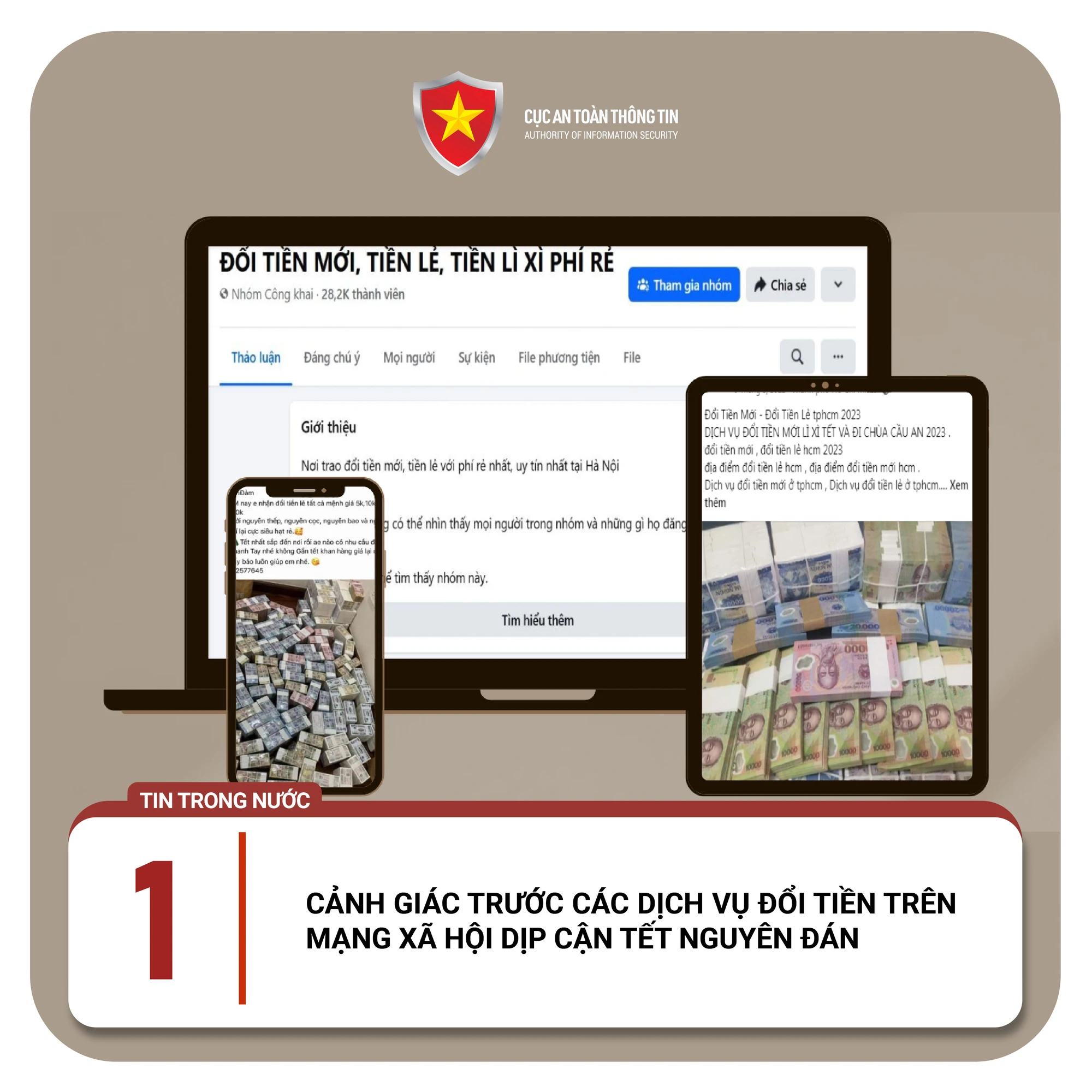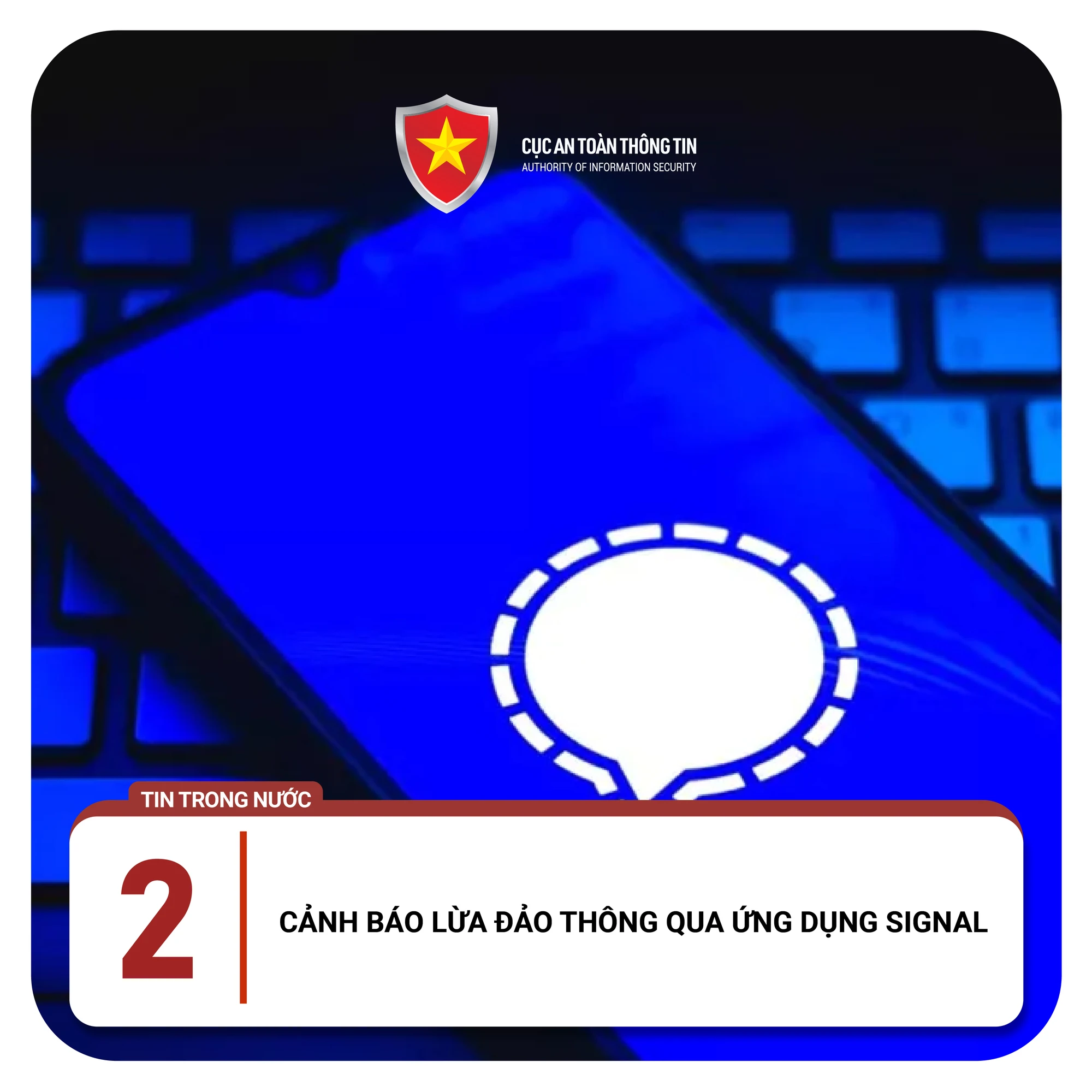NDO - Money exchange services on social networks are becoming more and more popular during the Lunar New Year, but at the same time, they also pose many risks. People need to be vigilant against strangers and absolutely do not exchange money via social networks to avoid becoming "prey" for fraudulent activities.
 |
Money exchange services on social networks near the Lunar New Year are becoming more and more popular, but at the same time, they also pose many risks. At this time, the need to exchange small change (new money) for lucky money or to prepare for consumer activities during the Tet holiday is very large, which has created opportunities for online money exchange services to appear.
However, scammers have taken advantage of the opportunity, playing on people's psychology and needs to commit fraud with extremely sophisticated tricks.
Every year, as Tet approaches, just type in the keyword "exchange Tet lucky money" on social networks and hundreds of posts and groups will appear with invitations and commitments of "real money", "new money", "cheapest price on the market"...
Many account holders even accept “wholesale” of small change and new money for those in need or recruit collaborators to post articles. In addition to the service of exchanging new money and small change, “money traders” on the internet also sell lucky money, unique money, rare money, and foreign currencies of many countries.
These currencies are mainly transferred directly from abroad, with the selling price often many times higher than the actual face value depending on the uniqueness of the currency.
Refer to the prices of some new money exchange establishments in Hanoi , the exchange fee for 10,000 VND, 20,000 VND and 50,000 VND is about 5-6%. With higher denominations or more money exchanged, the exchange fee will be a little cheaper. There is even the concept of "pre-used money", which means used money has an exchange fee of only about 2-3%.
However, advertisements for new money exchange services on social networking sites pose many risks to money exchangers. In fact, there have been many victims who have made new money exchange transactions but when they received the money back, it was not as promised, or even counterfeit money.
There are many cases where after people transferred money, the social networking account owner blocked contact and disappeared, "skipping" the customer's deposit.
Usually, people who "fall into the trap" of scams and get counterfeit money exchanged consider it "unlucky" and do not dare to report to the authorities for fear of being prosecuted for buying and selling counterfeit money.
Accordingly, all acts of collecting and exchanging new money or small change from other individuals and organizations to enjoy the difference and exchanging money online without permission are violations of the law and must be prevented and strictly handled.
In response to the above information, the Department of Information Security ( Ministry of Information and Communications ) recommends that people be vigilant against unknown individuals and absolutely do not exchange money via social networks to avoid becoming "prey" and aiding fraudulent acts.
You should only use currency exchange services from banks, financial companies or reputable businesses with legal operating licenses.
For services on social networks, before making a transaction, check feedback from old customers, reviews or legal certificates of the service; compare the exchange rate difference with the market, do not trust services with exchange rates that are too high compared to the market.
Be wary of services that require money transfer before receiving the goods. When detecting subjects with acts of storing, circulating counterfeit money or other fraudulent and profiteering acts, it is necessary to promptly report to the nearest police agency for measures to prevent and handle according to the provisions of law.
 |
On December 30, 2024, cybersecurity experts issued a warning regarding a scam campaign on the free, two-way encrypted messaging and calling platform - Signal.
Accordingly, a clear trend is that many scammers operating from “scam farms” in the Southeast Asia region, are moving from Telegram to Signal as their primary scam communication platform.
Common scams include: fake financial investment platforms, romance scams, and impersonating others; sending links containing malicious code to scam…
These subjects even impersonate government agencies to gain the victim's trust or pretend to be bank or financial company employees to ask you to provide personal information or transfer money.
Bad guys take advantage of this secure messaging app to commit fraud because Signal is a highly encrypted app, which helps hide their actions. At the same time, they can easily approach victims through this social network to build trust before committing fraud.
Faced with the above situation, the Department of Information Security (Ministry of Information and Communications) recommends that people need to be more vigilant, not only with one application, but on all social networking platforms, free messaging and calling applications.
Slow down, check your identity, review investment opportunities, and never share sensitive information online. Do not share sensitive information such as OTP codes, passwords, or financial information. Always verify any unfamiliar links, accounts, or organizations before taking action.
If you notice any signs of fraud, absolutely do not continue the transaction or dialogue, and report to the police to prevent and handle according to the provisions of law.
 |
In today's digital age, scams are becoming more and more sophisticated and dangerous, especially in the financial sector. One of the most common forms of fraud recently is impersonating bank employees to defraud people of loans or repayments.
This trick has caused many people, especially those who do not have much experience in finance, to fall into the trap of scammers.
Specifically, recently, the Investigation Police Agency, Dong Nai Provincial Police, issued a decision to prosecute and arrest Le Thi Huynh Nhu (born in 1998, residing in Xuan Loc district) to investigate the crime of "fraudulent appropriation of property".
According to the initial investigation results, due to needing money to pay off debts, from December 2023 to May 2024, Le Thi Huynh Nhu impersonated a bank employee, having customers needing to borrow money to pay off debts (such as tricking a man named S into borrowing 16.2 billion VND, borrowing 3.25 billion VND from Mr. D.TG), then appropriating it.
Dong Nai Police Investigation Agency determined that Le Thi Huynh Nhu's trick is not new, but many people are still deceived.
The subjects often claim to be employees of a large bank, calling or texting customers with the excuse of "notifying them of preferential loan packages" or "updating credit information". Then, they ask the borrower to provide personal information such as ID number, bank account number, income level, loan purpose, etc.
Even if the customer has a loan at the bank, the subject will notify "payment due" or "need to extend the loan". They ask the customer to transfer money to another account or provide personal financial information to "guarantee the transaction".
After the victim trusts and follows the instructions, the subject will present reasons to make the victim wait, then block all communication and take all the money.
People should note that banks will not proactively call customers to ask for account information, passwords, or request payments over the phone.
Notifications about loans, loan maturity or changes related to your account will usually be sent via the bank's official email or through secure channels such as banking apps, not via phone or strange messages.
The Department of Information Security (Ministry of Information and Communications) recommends that people proactively call the bank's official phone number to verify the identity of the subject. Absolutely do not provide personal information such as CCCD; bank account, OTP code,... in any form.
If someone asks you to provide this information, refuse immediately and notify the bank. Do not follow instructions from strangers, especially regarding money transfers.
Do not access strange links or download applications of unknown origin. In case of suspected fraud, people should immediately report to the nearest police station for instructions on how to handle the situation.
 |
Fox News (a major multimedia channel in the US) has just issued a warning about a new online fraud method through fake email messages impersonating Windows security and privacy services, the purpose of which is to take control of the victim's computer through remote control software to steal data.
Malicious actors create fake email messages, using logos and interfaces similar to regular Windows alerts. When the victim accesses the message, a pop-up notification appears, informing that access to the victim's device has been temporarily interrupted for security reasons.
The notification also comes with a repeating voice message and a warning siren to create urgency and danger, urging the victim to quickly contact the phone number to promptly handle and fix the problem.
After calling, the subject will pretend to be a Windows technician, instructing the victim to download UltraViewer software (Remote device control software) to check the victim's computer.
After the victim grants access, the subjects will scan and steal important data available on the device.
In the face of the development of fraud, the Department of Information Security (Ministry of Information and Communications) recommends that people be vigilant when receiving email messages with urgent notification content. Carefully verify through phone numbers or official Windows information portals.
Absolutely do not contact again by the methods provided in the notice, do not download any software and applications (even if they are valid). People are also advised to use reputable security software, turn on the computer firewall system to detect and warn of potential threats early.
When encountering suspicious signs, people need to quickly report to competent authorities to promptly investigate and prevent fraudulent behavior.
 |
KSBY TV station (California, USA) reported that recently, people have continuously received messages said to come from the US Postal Service, informing that the shipping process has been interrupted because the recipient's package has invalid information.
In fact, this is a scam, used by bad guys with the purpose of stealing victims' information.
The subjects send fake messages to victims, informing them that a package cannot be delivered because the postal code written on the package is invalid, asking the victim to provide more information about the package so that the delivery process can continue.
The subjects included in the message a link to a fake USPS (United States Postal Service) homepage, asking for access to provide information and also stating that if the issue was not resolved within the next 24 hours, the package would be returned.
After accessing the link, the victim will be redirected to a fake website. Here, the website will request information such as home address, full name, phone number, bank card information, etc. to verify the delivery route is correct and valid.
In response to the above-mentioned scam, the Department of Information Security (Ministry of Information and Communications) recommends that people be vigilant when receiving messages with the above content. Carefully verify information such as items inside the package, price, shipping costs, sender information and address...
Never provide personal information through links that contain strange characters, have suspicious interfaces, or do not directly redirect visitors to applications available on the device.
When detecting suspicious signs, people need to quickly report to the police to promptly investigate, prevent fraud and track down the subject.
Source: https://nhandan.vn/doi-tien-qua-mang-xa-hoi-dip-can-tet-de-tro-thanh-con-moi-cho-toi-pham-lua-dao-post854639.html



![[Photo] The road connecting Dong Nai with Ho Chi Minh City is still unfinished after 5 years of construction.](https://vphoto.vietnam.vn/thumb/1200x675/vietnam/resource/IMAGE/2025/11/04/1762241675985_ndo_br_dji-20251104104418-0635-d-resize-1295-jpg.webp)

![[Photo] Ca Mau "struggling" to cope with the highest tide of the year, forecast to exceed alert level 3](https://vphoto.vietnam.vn/thumb/1200x675/vietnam/resource/IMAGE/2025/11/04/1762235371445_ndo_br_trieu-cuong-2-6486-jpg.webp)
![[Photo] Ho Chi Minh City Youth Take Action for a Cleaner Environment](https://vphoto.vietnam.vn/thumb/1200x675/vietnam/resource/IMAGE/2025/11/04/1762233574890_550816358-1108586934787014-6430522970717297480-n-1-jpg.webp)
![[Photo] Panorama of the Patriotic Emulation Congress of Nhan Dan Newspaper for the period 2025-2030](https://vphoto.vietnam.vn/thumb/1200x675/vietnam/resource/IMAGE/2025/11/04/1762252775462_ndo_br_dhthiduayeuncbaond-6125-jpg.webp)






























































































Comment (0)